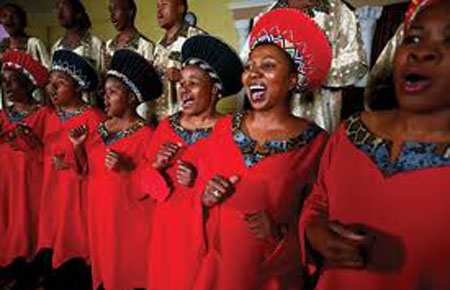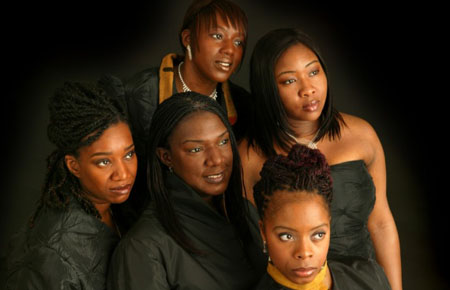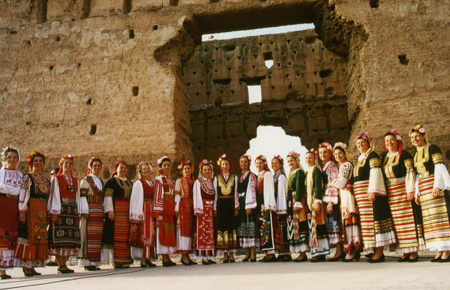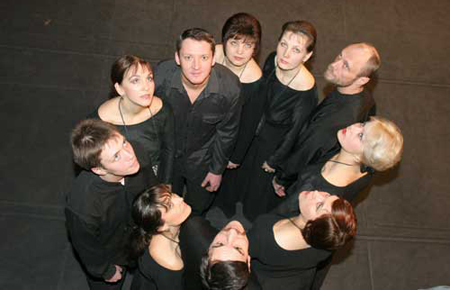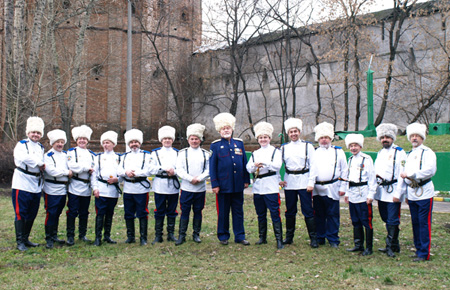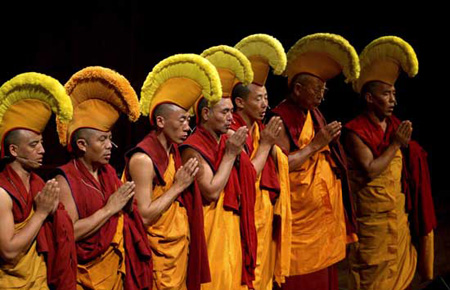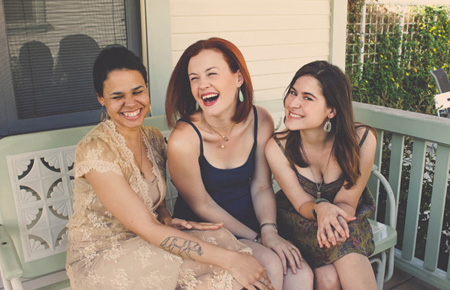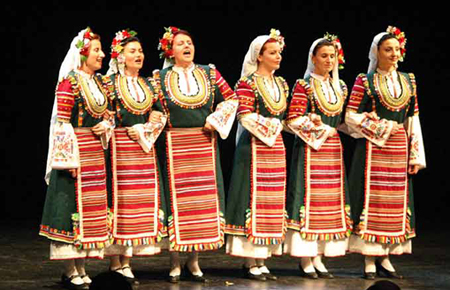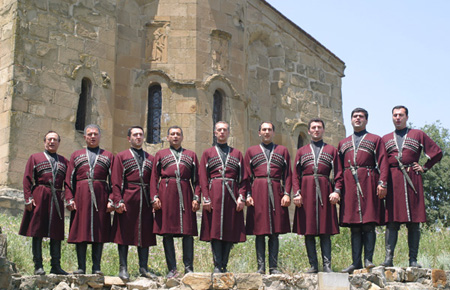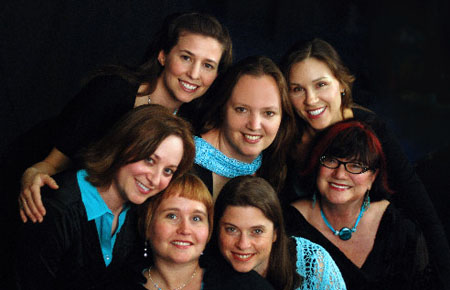In Celebration of the Human Voice - The Essential Musical Instrument
Home | Doo Wop | Barbershop | World | Contemporary | Christian | Vocal Jazz | Choral | Christmas | Instructional | Arrangements
Classical | Opera | Musicals | Personality | Young Singers | Disney | Videos | Songs | The Artists

World Music Vocal Harmony Groups
Most every culture has a tradition of group harmony singing often with a unique sound developed over the centuries. There are many vocal harmony groups around the world that continue these traditions with some preserving the songs in their original forms while others groups explore new possibilities for traditional songs. These world music vocal harmony groups offer a wide and diverse selection of music that is bound to please the more adventurous listener.
Displaying 1 - 50 of 57 items.
Academic Folk Choir
The Academic folk choir of the Academy of music, dance and fine arts - Plovdiv is the only student choir in Bulgaria. It was founded in 1972 with the creation of the specialty "Folklore instruments and singing".
The choir has a wide diapason in its style palette of repertoire - beginning with the original folk song from the different regions of the country and polyphonic arrangements, original compositions with avant-garde expression techniques (aleatory and sonority), ancient orthodox songs, etc.
With its high artistic level of performing the choir is equal in technique and artistry to a number of professional choirs. The choir performs songs, based on folklore and overcomes vocal, technical and interpretational difficulties.
African Methodist Choir with Mara Louw
Handpick singers from a number of South African choirs, put the excellent Mara Louw out in front as the lead, take a number of hymns they all know from church, as well as the South African national anthem, and you have the ingredients for this excellent disc. Unlike so many hymns, these are performed with great, roaring joy (arranged for the most part by Louw) and recorded -- as it should be -- in a church. But unlike, say, American or Jamaican gospel, there's a sense of unity, rather than testifying; the voices embrace this music, but they sing it as it is, rather than using it as a lift-off point to testify.
The harmonies might have their written roots in Europe, but the voices singing them are ineffably African, bringing something different to the sound. There's a sense of control about it all, even when a speaking voice breaks in on "Jerusalem Ikhaya Lam," for instance, or on the rare instances some very spare percussion accompanies the a cappella voices. It's majestic, but that's the intent, a nexus between Europe and Africa, meeting in Christianity. That's even there on the by-now famous "Nkosi Sikelel'i Afrika," the country's very hymn-like national anthem, performed here as the closer, full-voiced and glorious, sung with unconcealed pride and joy. ~ Chris Nickson, All Music Guide
Akasa
Vocal harmony and percussion creates the sound that is Akasa. This four member group from Melbourne, Australia sing passionate, rhythmic music a cappella style. Four distinctive singers, who combine great songwriting skills and musical abilty to form a repertoire that is original and distinctive. Influenced by the sounds, politics, social and cultural movements across the world, Akasa's music is immediate, relevant and empowering. Akasa formed in 1998 in Melbourne Australia.
Within a short time Akasa was heralded as the most promising vocal act in Australia, and although each member of the group had established solo careers outside Akasa, the band soon became the major focus for the women as performance schedules increased and interest in the group grew
Aquabella
Aquabella is an all-female vocal group whose members live in Berlin, Bremen and Amsterdam. Sharing an interest in languages and cultures from around the globe, the singers of Aquabella have found a musical identity in their farreaching search for diverse cappellic beauty. Aquabella gathers sounds rich in story and emotion from the heart of distant lands and times past. The five dedicated singers bring a contemporary outlook to historic songs, creating music that embraces the past, yet remaining fresh in its conception.
Aquabella take their audience on a musical tour around the world and connect cultures with each other. They shout whisper and sing about big human dreams and also tell stories about of people, who could both live in your neighbourhood and at the other end of the world. In this fast-moving life the four AQUABELLA-singers create wonderful oases of the sound and give an insight into foreign cultures and old traditions. They touch brand-new themes, very often themes about human existence.
Barbara Furtuna
Barbara Furtuna is a polyphonic Corsican group of four men. Even though the group still finds its inspiration in the island's oldest traditions, it is now distinguished by its own creations and offers a music that answers our contemporary longings.
For ten years the group has been present on the international scene, Europe, North America and Australia, breeding prestigious venues both solo and through collaborations. With The baroque ensemble L'Arpeggiata, with the ancient music of Constantinople as well as with the Art'Mouv of contemporary dance, the quartet has shown that It could transcend a single register and traditional music and still has the ability to surprise us and to move us.
Black Voices
Quietly and gently, informally and gradually, Black Voices was nurtured under the directorship of Carol Pemberton and Bob Ramdhanie. Since 1987, these two friends have steered Black Voices into one of the most solid performance and teaching companies, sharing a cappella, primarily from Africa but also throughout the Diaspora. The company is inspired by Sweet Honey in the Rock, Mahalia Jackson and Take Six, to name but a few, but since inception, has forged its own dynamic way of distilling and re-presenting black music from a Caribbean, black British perspective. Grounded in the black church, the group began presenting a cappella, both sacred and secular, which was always challenging and entertaining. From gospel to spirituals, Caribbean to African, jazz and blues, Black Voices is firmly rooted in music that energises and uplifts, challenges and educates. The company hosted and presented its own a cappella series with BBC Radio 2, has performed for radio and television in numerous countries around the world, has produced nine CDs, and has researched, produced, directed and performed in several international collaborations.
Blue Murder
Blue Murder is an occasional English folk "supergroup", consisting at various times of various members of Swan Arcade, Coope Boyes and Simpson, Waterson:Carthy and The Watersons.
Dave and Heather Brady and Jim Boyes of Swan Arcade and The Watersons' Norma and Lal Waterson gathered at Whitby Folk Week in August 1986 for a charity concert for the benefit of the local school. The ensemble, probably performing as The Boggle Hole Chorale, performed at the Festival's final ceilidh.
In 1987, Ian Anderson invited The Watersons and Swan Arcade to appear at Bracknell Festival, separately and together. The collective group was named "Blue Murder" by Martin Carthy. The line up for the festival was: Martin Carthy, Norma, Lal, Rachel and Mike Waterson, Heather Brady, Dave Brady and Jim Boyes.
This version of Blue Murder performed in 1987 and 1988 at Wath upon Dearne in South Yorkshire, at The Queen Elizabeth Hall in London, at a variety of British festivals, and at the Brossella Festival in Brussels. A demo was put together from their Wath concert performance and a track from a concert in Bracknell appears on The Carthy Chronicles (Free Reed FRQCD-60), but this incarnation of the band made no studio recordings.
Boarding Party
It's been too many years, but now my favorite group of singers/scholars/rowdies has rewarded our patience with another collection of water-songs. And a collection of great variety, too: favorite old chanteys, nautical gospel songs, a couple of original songs, a cable-laying song, a Bengali rowing song, songs from the rivers, lakes and canals, as well as the oceans, high and low. Some are tongue-in-cheek, some just good roaring fun, but most ring with the great dignity of sincerity., Some of these songs would have died in the archives had not Bob and Jonathan made new tunes for them, and many would be lost to us forever without the work and interest of these men. They're scholars and historians, and their big robust voices lift these songs into our present very well.
Bulgarian Voices - Angelite
A choir comprising two dozen female singers from across the nation, the Bulgarian Voices--Angelite were largely unknown to the world at large prior to the fall of communism, but in the years since the Iron Curtain was lifted the ensemble toured the globe many times over, enchanting audiences with their singular blend of classical and folk traditions.
Celtic Woman
Celtic Woman is an all-female Irish musical ensemble conceived and assembled by Sharon Browne and David Downes, a former musical director of the Irish stage show Riverdance. In 2004, he recruited five Irish female musicians who had not previously performed together: vocalists Chloe Agnew, Orla Fallon, Lisa Kelly and Meav Ni Mhaolchatha, and fiddler Mairead Nesbitt, and shaped them into the first lineup of the group that he named Celtic Woman. Downes chose a repertoire that ranged from traditional Celtic tunes to modern songs.
The group's lineup has changed over the years; in 2009, the group consisted of Chloe Agnew, Lynn Hilary, Lisa Kelly, Alex Sharpe and fiddler Mairead Nesbitt; Alex Sharpe left the group in May 2010. Seven albums have been released under the name "Celtic Woman": Celtic Woman, Celtic Woman: A Christmas Celebration, Celtic Woman: A New Journey, Celtic Woman: The Greatest Journey, Celtic Woman: Songs from the Heart, Celtic Woman: Believe and Celtic Woman: Home for Christmas. The group has undertaken a number of world tours. Cumulatively, albums by Celtic Woman have sold over 6 million records worldwide. The Celtic Women are all of Celtic origin.
Cockersdale
For many years Cockersdale have been one of the leading unacompanied groups in the UK. Originally formed by Keith Marsden to perform his songs, the group's reputation soon grew making them a major force in folk music. Following Keith's death in 1991 Cockersdale reformed and re-established themselves as one of the most popular groups on the UK folk scene.
Coco's Lunch
Renowned for their extraordinary song-writing, skin-tight vocal harmonies and stunning live performances, Coco's Lunch have long been recognised as award-winning pioneers in the composition of innovative Australian vocal music. Featuring Melbourne singer/percussionists Gabrielle MacGregor, Lisa Young, Sue Johnson, Nicola Eveleigh and Jacqueline Gawler, Coco's Lunch has spent over 15 years winning the hearts of audiences across Australia, China, Singapore, Hong Kong, Laos, Taiwan, Germany, Austria, France, New Zealand & Canada. Coco's Lunch perform worldwide for both adults and children, and in 2007 released their 6th album Blueprint to critical acclaim and an Australian Recording Industry Award (ARIA) nomination for BEST WORLD MUSIC ALBUM. In the same year they received an ARIA NOMINATION for BEST CHILDREN'S ALBUM for their CD Rat Trap Snap!
David Fanshawe
David Fanshawe, a Churchill Fellow and the recipient of many international awards, was an internationally distinguished composer, ethno-musicologist, sound recordist, archivist, performer, dynamic and entertaining lecturer, record producer, photographer and author. Also widely known for his lead roles in documentaries; a TV, radio and public personality extraordinaire, he is acclaimed as "one of the world's most original composers."
David Fanshawe was born in 1942 in Devon, England and was educated at St George's Choir School and Stowe. In 1959 he joined the Film Producers Guild in London gaining valuable experience as a documentary film editor and recordist. In 1965, he won a Foundation Scholarship to the Royal College of Music, studying composition with John Lambert. He gained national recognition in 1970, as cantor soloist and composer, at the Queen Elizabeth Hall, with Salaams, a work based on the rhythms of the Bahrain pearl divers. His ambition to record indigenous folk music began in the Middle East, in and was intensified on subsequent journeys through North and East Africa (1969-75) resulting in his unique and highly original blend of Music and Travel.
Dis Moi
'Dis Moi' is a powerfully soulful A Cappella trio of women (Samantha Keller, Tamar Fogel and Heather Houston), who enchant their audiences with songs sung straight from the heart! Their musical repertoire incorporates a wide range of styles from around the globe, as well as inspired originals, with themes of love, hope, healing and unity. 'Dis Moi' means 'tell me' in French, and reflects the members' belief and hope that their music will open people to expressing themselves as they feel called. As a visionary trio, they feel that their calling is to be an integral part of the healing movement of the planet. Their radiance is intoxicating, as they shine their deep love for one another, for their music, and for humanity as a whole; inspiring the crowd to open their hearts to the healing harmonies. Their thought provoking lyrics, and grounded words of wisdom, uplift spirits, stir souls, and inspire movement in consciousness. This is not your typical A Cappella music. Let the harmonies of these lovely women take you on a journey of heart, mind and soul as they weave their voices in a unique tapestry of spirited song.
Dmitri Pokrovsky Ensemble
The renowned Dmitri Pokrovsky Ensemble was founded in 1973. Wearing traditional Russian village costumes and performing on ancient instruments, the Dmitri Pokrovsky Ensemble brings the authentic folklore of Russia back to life. Some of their lively recreations of village songs, dances and pagan rituals are more than 2000 years old. Since its founding, the Ensemble has been featured on the Paul Winter Consort's Earthbeat tour (USA) and has given performances at numerous international festivals. The group has been featured in more than two dozen films, participated in many Russian theatrical pieces and appears regularly on Russian television.
Don Cossack Choir
After World War, I the Cossacks who fought for Tsar Nicolaj II were sent to the Tschillinger Camp. There they lived a miserable life. Trying to forget all misery they sang the songs of their homeland at the campfire. A 25 year old lieutenant, Sergej Jarov, with a remarkable education in music, took the lead and so a community, which was destined to become one of the famous choirs in the world, was born. The maiden concert took place in Sofia (4th July 1923) and soon after that they gave a concert in Vienna. During the following years, the Don Cossacks went to many countries all over the world and they gathered great fame.
Just before Sergej Jarov died, in Lakewood, United States, this unique choir fell apart. Most members went their own musical way. So did Michael Minsky, one of the star-soloists with an impressive musical background of the original Don Cossacks Choir. He did his utmost to restart the Don Cossacks Choir with a number of very enthusiastic singers in the The Hague region. Immediately after the restart he became the conductor of the new Don Cossacks Choir in The Netherlands.
Faraualla
Faraualla is the deepest karstic cavity of the Murgian upland in Apulia. This chasm opens among fields of wheat, pastures and farms, a silent isle that has inspired popular believes.The origin of this name remains obscure but its pronunciation fills the mouth with voice. As when a word forgets its meaning to be, once again, sound: pure, crude and mighty. This new perception strengthens vocality and makes the voice give back the instinct of singing. So, pieces of voices and stories are handed down, multiplying.
femme m'amie
This highly acclaimed a cappella group, whose name means "woman, my friend," will perform selections from their diverse repertoire, including Shaker music. Sharing a woman's view of the world, femme m'amie delights audiences with their pitch perfect harmonies, full arrangements, and simple elegance.
Fleur-de-Lisa
Fleur de Lisa is based in Durham, North Carolina. They write and perform original a cappella music, often based on poetry. Individually they bring many disciplines together, including jazz, rock, classical and country. Their diverse musical experiences blend into a versatile style of their own. Individually they bring many disciplines together, including jazz, rock, classical and country. They use all these experiences when they create their unique music. They have performed in Atlanta, Pittsburgh, throughout NC and the Eastern US.
Grupo Vocal Desandann
A vocal and percussion ensemble, Desandann celebrates and preserves the rich legacy of Haitian cultural traditions in Cuba. The ensemble grew out of a request by members of the Association of Haitian Residents and Cubans of Haitian descent (see Haiti in Cuba) to research and compile traditional Haitian music. In a short time they have gained national and international recognition.
Between 1795 and 1805 30,000 Haitians emigrated to eastern Cuba with another wave occurring from 1920-1940 and yet another in the 1980s. Today, estimates of the Haitian population in Cuba range from 300,000 on up to 1 million. Each wave of immigrants had its own distinct characteristics and brought with them the strong musical and dance traditions, their religion, customs, rituals and cultural habits on their journey from Haiti to Cuba. With information gathered from generations of Haitian immigrants, Desandann promotes and performs music of Haitian origin, especially "La Cancionistica", music which has been enriched by elements of other Creole speaking Caribbean countries.
Gyuto Monks
The powerful Gyuto monks chants on this album had never been recorded until 2001, when Grateful Dead's Mickey Hart brought The Gyuto Monks Tantric Choir to his California studio to record the incredible multiphonics of their sacred rituals. The Gyuto monks gave Hart permission to overdub their voices, achieving the huge sound of the 100-voice choir as one might hear at their mountain monastery in India or Tibet. Gyuto monks prayers for healing, compassion and peace.
Honey Whiskey Trio
Honey Whiskey Trio blends sounds and styles from folk, bluegrass and jazz. This trio found its roots in the vocal jazz department of CSU Long Beach where the members all studied with Christine Guter, though at different times. Years later, well into their own careers as musicians and educators, the need for a new outlet for musical exploration brought Courtney, Ann and Christina together and the Honey Whiskey Trio was formed.
Insingizi
This extraordinary trio from Bulawayo, Zimbabwe offers uplifting performances filled with harmonious a cappella singing, traditional chants, hand percussion, and superb choreography. Their songs possess a gentleness and honesty that stir the soul, conveying a wide range of challenges facing people today. A particular highlight of their live shows is the energetic performance of the traditional "gumboot dance" of the oppressed South African miners of long ago. Insingizi's music is filled with hope, optimism and faith, including such stirring compositions as Amasango, which means heavenly gates, a song that imparts the group's message of the ultimate answer to the world's seemingly insurmountable obstacles.
Johnson Girls
Sea music may well have been the first "world music." Ships were often melting pots, with crew members from many countries who were heavily influenced by the music they heard while traveling around the world and from other crew members. These sailors incorporated into their work songs and other shipboard music the different rhythms and styles from their own often diverse cultures as well as those they encountered during their voyages. Each of The Johnson Girls was captivated by this music at different times in their lives, and came together in 1997 following the Mystic Seaport Sea Music festival to burst through the barrier of this previously male dominated genre. The Johnson Girls is an energetic all-woman mostly a cappella group performing folk music with an emphasis on songs of the sea and shore. Each member of the group brings a specialty and style to the ensemble. The Johnson Girls' extensive repertoire of both traditional and contemporary music includes songs with an Afro-Caribbean influence, of the inland waterways, of fishing, mining, Irish, Anglo-American, Italian and French Canadian ballads and work songs, and much more.
Kahurangi
The Kahurangi Maori Dance Theatre was at the forefront of the renaissance of Maori Performing Arts. Formed in the early 1980's by Tama Huata and a team who shared his vision to present Maori performing arts in a dynamic and contemporary manner, our touring teams have travelled the world promoting cultural understanding, and inviting audiences to participate in their programmes.
Kahurangi is a New Zealand treasure with extraordinary vitality, passion, strength and athleticism. They have thrilled audiences with their unique blend of Maori song, dance and heritage. The Company employees outstanding young Maori performers and graduates of the Takitimu Performing Arts School, (the first tertiary institution in New Zealand to offer a degree course in there traditional Maori performing arts) who reflect the energy of Ngati Kahungunu carrying the listener on a journey of discovery and celebration.
Kitka
Kitka is an American women's vocal arts ensemble inspired by traditional songs and vocal techniques from Eastern Europe. Dedicated to developing new audiences for music rooted in Balkan, Slavic, and Caucasian women's vocal traditions, Kitka also strives to expand the boundaries of folk song as a living and evolving expressive art form. Kitka's activities include an Oakland-based home series of concerts and vocal workshops; regional, national, and international touring; programs in the schools; recording, publication, and broadcast projects; master artist residencies; commissioning; community service work; and adventuresome collaborations.
Founded in 1979, Kitka began as a grassroots group of amateur singers from diverse backgrounds who met regularly to share their passion for the stunning dissonances, asymmetric rhythms, intricate ornamentation, lush harmonies, and resonant strength of Eastern European women's vocal music. Under the direction of Bon Singer from 1981 to 1996, Kitka blossomed into a refined professional ensemble earning international renown for its artistry, versatility, and mastery of the demanding techniques of traditional and contemporary Balkan, Slavic, and Caucasian vocal styling.
Konevets Quartet
The Konevets Quartet was founded in 1992 by four young musicians from the St Petersburg Conservatoire who were singing in the choir of the Konevets Monastery of the Holy Nativity on the island of Konevets in Lake Ladoga. Their first audiences were the people working on the restoration of the monastery, and the pilgrims and tourists who came to the island.
All the members of the ensemble studied at the St Petersburg Glinka Choir College. Trained in the tradition of Russian song, the Konevets Quartet is not just a group of individual soloists, but is in essence a chamber choir dedicated to creating a perfect harmonious ensemble sound.
At the heart of their repertoire is Russian church music, from ancient material written for the monasteries to works by 20th century composers. The earliest church music is sung in unison or in arrangement for two or three voices, and in contemporary four-voice arrangements, many of them written by members of the Konevets Quartet.
La Novem
The Bearn province in south-western France has a polyphonic tradition of song which can still be heard today. The songs are performed while standing in a circle, allowing the voices to intertwine to achieve a true sense of unity. From pastoral scenes to contemplations on love, these songs vary from region to region and are continually evolving. The gutsy natural singing style and many of the harmonies are reminiscent of the Bulgarian style. This recording by La Novem is a unique and special musical experience.
Ladysmith Black Mambazo
For over forty years, the voices of Ladysmith Black Mambazo have married the intricate rhythms and harmonies of theirnative South African musical traditions to the sounds and sentiments of Christian gospel music. The result is a musical and spiritual alchemy that has touched a worldwide audience representing every corner of the religious, cultural and ethnic landscape. Their musical efforts over the past four decades have garnered praise and accolades within the recording industry, but also solidified their identity as a cultural force to be reckoned with.
Assembled in the early 1960s, in Durban South Africa, by Joseph Shabalala (still currently leading the group) - then a young farmboy turned factory worker -Joseph took the name Ladysmith Black Mambazo - Ladysmith being the name of Shabalala's rural hometown; Black being a reference to oxen, the strongest of all farm animals; and Mambazo being the Zulu word for axe, a symbol of the group's ability to "chop down" any singing rival who might challenge them. Their collective voices were so tight and their harmonies so polished that they were eventually banned from competitions - although they were welcomed to participate strictly as entertainers.
Latvian Voices
Latvian Voices is an a cappella vocal group from Latvia - the Land that sings! With their voices as the only musical instrument girls from Latvian Voices have developed a unique individual vocal style, in which ethnic musical intonations of many nations intertwine. The most significant role in this kaleidoscope is allocated to Latvian folk music supplemented with elements of traditional choir music and popular music. Most of the repertoire is arranged and composed by the members of the group, which makes Latvian Voices a truly unique phenomenon.
Le Mystere Des Voix Bulgares
In 1951, the father of Bulgarian concert folk music, Philip Koutev, established the Ensemble of the Bulgarian Republic. His goals was to join the rich heritage of his country's solo folk songs with harmonies and arrangements that highlighted their beautiful timbres and irregular rhythms. One year later, the Bulgarian State Radio and Television Female Vocal Choir was founded. Then as now, its members are singers from the rural regions of Bulgaria, each an informal apprentice in the folk songs of her home. The ensemble, now under the direction of conductor Dora Hristova, has refined Koutev's original idea into a fine art. The Choir's imaginatively arranged songs join traditional folk melodies with sophisticated harmonies and compelling rhythms, performed in an exotic six-part vocal style. Repertoire is drawn from arrangements created by Bulgaria's most esteemed composers, among them Mr. Koutev, Krasimir Kyurkchiyski, Nikolai Kaufman and Petar Lyondev.
Libana
takes its name from a 10th century Moorish woman, who was a poet, philosopher, and musician, symbolically representing women's creativity and vision throughout time. The group was founded by its Artistic Director, Susan Robbins in 1979, with the idea of exploring and performing music and dance which reflect women's often undocumented creative contributions to their cultures. For the past 29 years, they have taken audiences throughout North America and Europe on inspiring and celebratory musical journeys, weaving together the songs, dances and instrumental music of the world's cultures, especially as handed down through the artistic traditions of women.
Their repertoire of ancient melodies and contemporary tunes is performed a cappella and with a vast array of instruments including guitar, dumbek, accordion, oud, naqqara, clarinet and double bass. Their music is drawn from the divergent cultural expressions of the Mediterranean, the Balkans, the Middle East, Europe, Africa, Asia and South America. Libana's music and dance go directly to the heart, inspiring audiences with wonder in the commonality of the global community.
Lingonberries
The Lingonberries are a bilingual a cappella quartet based in Ottawa. That's bilingual as in English and Swedish. All four members are originally from Sweden. Three of them moved to Canada fairly recently, only Helene moved from Sweden as a child and grew up in Canada. The group performs regularly in Ottawa. You might have seen them at local venues, including National Arts Centre 4th Stage, Rasputin's and The Elbow Room. The Lingonberries recently performed at the Museum of Civilization as part of the successful exhibit "Viking: The North Atlantic Saga". They've also been featured on CBC TV Canada Now, Breakfast Television, NewRO News At 11, CJOH News At 6, CBC Radio's "Ottawa Morning", Rogers Television's "Daytime", The Ottawa Citizen and in the Ottawa Sun. In addition to their public appearances, The Lingonberries often entertain at private parties and functions.
Madrigaia
Madrigaia was born in Manitoba, in the heart of Winnipeg's French community, in the spring of 1999. The women of Madrigaia, all musicians, dancers and actresses among the most respected in their musical community, took their love of singing and improvising together onto the stage. Combining breathtaking harmony with pulsing vocal and instrumental percussion, Madrigaia sweeps audiences into a storm of music from around the globe.
Madrigaia has created a highly original and entertaining show which unerringly enchants and captivates its fast-growing audiences. Drama, movement and pulsing, percussive elements are combined as they perform songs from over a dozen different countries, such as Brazil, Bulgaria, Croatia, India, Poland, Israel and of course from their French-Canadian roots. Madrigaia has had the honour of performing before personages of note and royalty, and has received recognition and accolades from its peers and professionals of the musical industry, such as producers Sergio Natureza (Brazil), Norman Dugas and Don Benedictson, composer Stephen Hatfield, performers Jane Siberry, Kiran Ahluwalia and The Toronto Tabla Ensemble and artistic director Louis Saint-Andre.
Malaika
Malaika is a four-woman vocal group that sings music from around the world. Based in Ottawa, Canada, Malaika consists of Neema Mugala (soprano), Lee Hayes (mezzo-soprano), Beth Ferguson (alto), and Stella Haybukhai (bass). These women blend their diverse musical and cultural influences to create fascinating musical collaborations of traditional and original material. Malaika's captivating rhythms and richly interwoven harmonies, combined with genuine warmth and natural humour, create an overwhelming audience response wherever they perform. Malaika's repertoire includes songs of social struggle, African music, traditional folk songs, gospel tunes and pop songs, with some jazz, country and even a Japanese love song thrown in! While much of the material is in English, the group sings in many other languages including French, Swahili, Portuguese, Xhosa, Swedish, and Japanese. The group works democratically, with everyone sharing in the songwriting, the arranging, and the lead vocals.
Maura O'Connell
Since her U.S. debut fourteen years ago, the internationally-acclaimed stylist has applied her luminescent voice to the songs of John Hiatt, Janis Ian, Tom Waits, Shawn Colvin, Mary Chapin Carpenter, Paul Carrack, Karla Bonoff and dozens of other song poets.
Along the way, she has earned a Grammy Award nomination and multi-platinum sales success in her native Ireland. She continues to impress with the release of WANDERING HOME, a selection of traditional Irish songs as extraordinary as her undeniable talent.
Through five esteemed U.S. releases, O'Connell has specialized in passionate yet respectful renditions of lyrics that stand the test of time. Her art has nothing to do with over-embellishing songs with vocal acrobatics and everything to do with communication.
Muungano National Choir, Kenya
Founded 1979 by Boniface Mganga, Muungano National Choir's musical style is a cappella, using the most abundant of musical instruments (the voice) with drum, Kayamba, (reed rattle) and occasional triangle accompaniment. The songs, like a lot of Africa's contemporary arts have sprung from a fusion of the rich and varied rhythmic and melodic traditional and neo-traditional African tunes with exuberant and intense quasi-western harmonic style.
The success of Muungano National Choir is not limited to Kenya only. In 1984, it participated with great success in the Indian Ocean Festival held in Perth, Australia.
Quartet Slavei
SLAVEI means "nightingale" in Bulgarian language and we understand the choice of this word when we listen to this great voices that combine clarity to emotion, strength of bulgarian tradition. The female quatuor SLAVEI represents an exceptionnal group for popular bulgarian songs. The 4 singers are former soloists of the Philippe Koutev famous ensembles : Mysteries of Bulgarian Voices and Angelite.
Their repertory comes from orthodox religious songs from Eastern Europe (usually only sung by men), and from traditionnal secular songs. Four great women, four magnifical voices, a perfect skill of a difficult and specific vocal technique, a unique repertory as it takes in traditionnel secular songs, but also in orthodox songs from XIVe to XXe century, usually dedicated to men. To hear these two styles, sung by divine voices, side by side, is a profoundly moving and fascinating experience.
Rhodopea Kaba Trio
Over the millennium ancient mythology has preserved the fine songs, sung by the followers of Orpheus under the starry heavens of the Rhodope Mountain, in praise of the forces of nature. The songs of the Rhodope Mountain have retained to this day a manner of singing as if drawn from nature itself. An endless horizon...range plies range, to eternity; this music, melodious, vast, sweeping. A free spirit springs from Rhodope songs, each song is unique and close to every Bulgarian.
Rhodope songs are interpreted variously, addressed to audiences with an awareness of various musical idioms. Rhodopea Trio has found a way of its own in its rendition.
The Rhodopea Kaba Trio was founded in the spring of 1989 in the town of Smolyan, on the initiative of Hristina Lyutova, the famous Rhodope folk singer. The performers, Hristina Lyutova, Silvia Nenkova and Mariyana Pavlova (Hristina Lyutova's daughter), are typical representatives of the Rhodope region vocal folklore.
Rustavi Choir
The Rustavi Ensemble (pronounced "roostahvi") is the best known of a considerable number of talented groups currently performing Georgian music. It was created in 1968 by Anzor Erkomaishvili, a singer and folklorist from a distinguished Georgian musical lineage that goes back seven generations. After graduating from the Tbilisi Conservatory, Erkomaishvill gathered singers from various parts of Georgia and began to build a repertory that brought together their different regional song styles and vocal timbres. Georgian vocal music is strictly divided between men's and women's genres, and from the beginning, the Rustavi singers have been male. Most songs are sung a cappella, but spare instrumental accompaniment on stringed instruments such as the "chonguri" and "phanduri" is sometimes added. A group of players within the Rustavi performs a separate instrumental repertory, and the Ensemble now also includes a dance troupe.
Slavyanka
Slavyanka is a mixed voice a cappella chorus based in San Francisco, California, and made up of amateur musicians from varied professions, including computer programmers, scientists, lawyers, and businessmen. The musical demands placed on the Chorus are quite high both because of technical content of the music and the nearly four octave range often required to sing it. We perform most of our music in Russian, though most of us do not speak Russian. Our chorus consists of 25 singers united by a common interest in the choral music of the peoples of Russia and Eastern Europe. Over the years we have compiled an enviable record of achievement.
Solstice
Solstice is a female vocal ensemble specializing in music written by women or for women's voices. Our music spans many different genres with an emphasis on world, classical, pop, and jazz. We are also committed to performing new works for women's voices and regularly compose, commission, and arrange new songs.
Solstice has performed in many Bay Area venues including Freight and Salvage, La Pena, the San Francisco Community Music Center, Music on the Hill, the Berkeley Arts Center, Trinity Chamber Music series, and Villa Montalvo. Solstice has also performed on KALW's Folk Music and Beyond On-Air Folk Festival.
Soweto Gospel Choir
Soweto Gospel Choir was formed to celebrate the unique and inspirational power of African gospel music. The 26 strong choir, under the direction of David Mulovhedzi and beverly Brye draws on the top talent from the many churches in and around Soweto. The Scotsman Newspaper exclaimed in its review "Nothing can really prepare you for the riot of exuberance and depth of emotion." Soweto Gospel Choir draws from the churches and communities in and around South Africa's most famous township. It mixes earthy rhythms with rich harmonies to uplift the soul and express the energy of South Africa. African gospel originated as a blend of traditional music rooted in song and percussion combined with the influence of 19th century missionary music. From this a new and exciting style of music evolved - African Gospel, celebrating all facets of daily life.
St. Ephraim Male Choir
The choir was founded in 2002 by Tamas Bubno, a Hungarian church musician and conductor. When he was collecting religious melodies in the Subcarpathian area in the Ukraine for his DLA thesis, entitled: Origin and Variants of Greek Catholic Liturgical Chants in Hungary and the Subcarpathian Area, one day he discovered an unknown manuscript of the Liturgy of St. John Chrysostom for male choir, composed by Janos Boksay; a Greek Catholic priest and composer at the turn of the century (1874-1940).
He decided to gather some of his friends, all professional singers working with the best choirs in Budapest (the Male Choir of the Defence Ministry, Choir of the Hungarian Radio, the National Choir, the Tomkins Vocal Ensemble, etc.) and some of his former students (from the Schola Cantorum Budapestiensis), to perform this work.
Stairheid Gossip
Mothers, lovers, sisters, grannies, workers, friends... From the stairheids of Edinburgh, four women (or five, including Rebecca McKinney, at the recording of the album) came together with a shared love of traditional music and singing. Our songs reflect the diversity of our musical interests, from Scotland to South Africa and from ballads to bluegrass, but they are all celebrations of the lives of everyday folk - in love, work, conflict and peace.
Sweet Honey In The Rock
Founded by Bernice Johnson Reagon in 1973 at the D.C. Black Repertory Theater Company, Sweet Honey In The Rock, internationally renowned a cappella ensemble, has been a vital and innovative presence in the music culture of Washington, D.C., and in communities of conscience around the world.
From Psalm 81:16 comes the promise to a people of being fed by honey out of the rock. Honey - an ancient substance, sweet and nurturing. Rock - an elemental strength, enduring the winds of time. The metaphor of sweet honey in the rock captures completely these African American women whose repertoire is steeped in the sacred music of the Black church, the clarion calls of the civil rights movement, and songs of the struggle for justice everywhere.
Rooted in a deeply held commitment to create music out of the rich textures of African American legacy and traditions, Sweet Honey In The Rock possesses a stunning vocal prowess that captures the complex sounds of Blues, spirituals, traditional gospel hymns, rap, reggae, African chants, Hip Hop, ancient lullabies, and jazz improvisation. Sweet Honey's collective voice, occasionally accompanied by hand percussion instruments, produces a sound filled with soulful harmonies and intricate rhythms.
Tahitian Choir
The Tahitian Choir is a choral group from the island known as Rapa Iti, one of the Bass Islands in the South Pacific, approximately 1,000 miles southeast of Tahiti. The choir is made up of 126 men and women. Their music portrays their traditional Tahitian life and dialect and has been recorded on two albums and one re-release, recordings produced by Pascal Nabet Meyer.
This caused a sensation when released in 1992 on Triloka. Its reappearance is welcomed, although not the sappy synthesizer accompaniment on the bonus track that opens the new disc. Fortunately, the remainder of the CD is solely the original acappella program. Although producer Pascal Nabet-Meyer requested the choir's oldest music, the diatonic harmonies, simple rhythms and lock-step movement on "Himene Tatou" and "Va Hiti" are strongly hymn-like.
Talisman A Cappella
Talisman A Cappella was founded by Stanford University students to research and perform culturally substantive music. From its inception in October 1989, Talisman has been committed to the belief that harmoniously blending cultures of diverse origins creates the richest and most beautiful experience both in music and in life. Thus the group embraces varied musical genres and traditions, celebrating cultures not ordinarily represented by vocal ensembles.
To challenge social and political injustice with both its music and its message has been an ambition central to Talisman since the group's founding. In its fourth and fifth seasons, not only was Talisman asked to sing for Nelson Mandela during his visit to Stanford University, the group also perfomed at a memorial service for Amy Biehl, a Stanford student slain while in South Africa promoting women's rights. The music from that service was later featured on the ABC news magazine program Turning Point.
Tenores de Oniferi
Some of the world's most unusual sounds are produced by Sardinia-based group Tenores de Oniferi. Rooted in Sardinia's polyphonic singing tradition, the group was described by Rod Stradling of Musical Traditions as "younger, faster and harder....both more suited to a 'world music' audience and closer to the tradition." Based in Oniferi, a town in the central Barbagia section of the island, Tenores de Oniferei represents the vision of lead vocalist Francesca Pirisi and his twin brother, Giovanni, who sings counter tenor.
Tenores di Bitti
The Tenores di Bitti "Mialinu Pira" have a special place amongst the many groups in Sardinia. Having a style which is slightly less rough than that of other quartets, exemplary researchers in their heritage, impeccable executors with exceptional vocal quality, adorable people, they have reached a level of excellence and of admiration which is without equal in Sardinia and in the whole world. Their frequent performances on so many national television programs are to be remembered. In the last few years they've been touring extensively Europe (France, Germany, Denmark, Norway, Czech Republic, Spain, Belgium, Nederland, Austria, Luxembourg, Slovenia, Swiss, Ireland, Croatia, Serbia, Lithuania, Tunisia, Hunghery, United Arab Emirates, Brazil and Japan). It is also remarkable their participation in 2001 to the Christmas Concert in the Vatican for the Pope Giovanni Paolo II, the concert on May 2009 in the Concertgebouw Theatre in Amsterdam and in December in the Church of the Nativity in Bethlehem.
 |  |
Page 1 = Academic Folk Choir-Tenores di Bitti Page 2 = Trio Esperanca-Zulal
Groups:- All | Vintage Harmony Groups | World Groups | Gospel Groups | Vocal Jazz Groups
Female Contemporary | Mixed Voice Contemporary | Male Contemporay | Contemporary Christian
Male Choral | Female Choirs | Mixed Voice Choirs | Early Music
Boyschoirs | Girl Choirs | Mixed Voice Childrens Choirs
Select a Category |
Want to Sing? - Find a Chorus Near You
List of Choruses by State | List of Choruses by City


